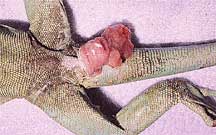Lizard Cloacal Prolapse
| This article has been peer reviewed but is awaiting expert review. If you would like to help with this, please see more information about expert reviewing. |
Cloacal prolapse is a common problem in lizards; it is usually secondary to an infective process or straining due to dystocia or constipation.
The clinical signs in a male lizard are usually one or both of the hemipenes prolapsed; in females, they usually include a partial prolapse of the oviduct; if complete this organ is usually severely traumatised.
- Diagnosis - History, physical examination, microscopy, culture and sensitivity.
- Treatment depends on the severity of the case:
- Mildly traumatised cases:
- Gently cleanse exposed tissues
- Apply local antibiotics
- Lubricate and replace
- Severely traumatised cases:
- Amputation under general anaesthesia
Amputation of hemipene: Place one or more mattress sutures through viable tissue proximal to proposed point of amputation. After excision allow ligated stump to retract into hemipenal pockets. Parenteral antibiotics are advised.
Amputation of oviduct: ovariosalpingectomy (see Lizard and Snake Dystocia)
Literature Search
Use these links to find recent scientific publications via CAB Abstracts (log in required unless accessing from a subscribing organisation).
Reptile prolapses. Greek, T.; The North American Veterinary Conference, Gainesville, USA, Small animal and exotics. Proceedings of the North American Veterinary Conference, Orlando, Florida, USA, 16-20 January 2010, 2010, pp 1672-1673 - Full Text Article

